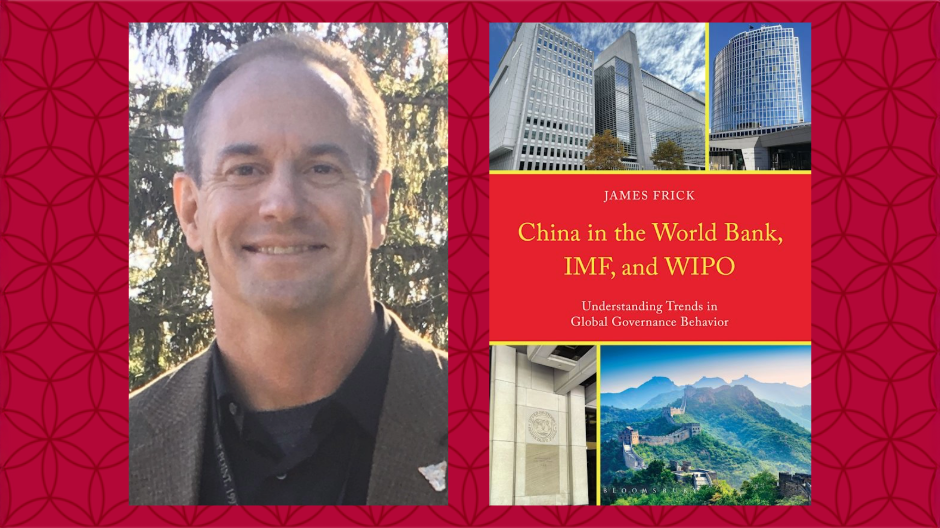Temple Political Science PhD alumnus James “Buddy” Frick recently released his new book, China in the World Bank, IMF, and WIPO: Understanding Trends in Global Governance Behavior. The book, which grew out of his PhD dissertation, explores China’s participation and behavior within these international organizations over the past four decades. We had the chance to speak with James about the research behind the book, his time at Temple and his 33-year (and counting!) career as an Officer in the U.S. Army.
You’ve had a long military career leading up to your work in academia. Can you walk us through that background?
I’ve been in the US Army for over 33 years. I graduated from West Point and then served multiple tours overseas, including in Iraq. I was stationed in Hawaii, where I had become a strategic planner, which led to my being invited to teach at the Army War College. I was fortunately selected for the Army War College Professor Program, which sent me to Temple to earn my PhD in political science. I did my coursework at Temple from 2016 to 2018, went back to the War College to teach and finished my dissertation in 2021.
What was your experience like at Temple?
I thoroughly enjoyed it. The political science department at Temple is just a fantastic bunch of people. I had a great cohort, and it was a wonderful opportunity for me to expand and reflect on my thinking and learn in new areas. I focused on international relations, with comparative politics as my secondary field. Since I’d been working at the theater level in the Pacific region, I already had some exposure at the international level. Going to Temple and earning a degree that focused on an area I’d been working in really made sense of everything I’d been doing up to that point. It was a really good experience for me.
Your new book builds on your dissertation. When did you know the project could grow into a book?
As I was finishing my dissertation, I knew this was a topic worth expanding upon. Upon its completion, my committee and I talked about avenues I could take to eventually publish down the line. I took an additional four years to finalize the book because I added a case study to it. I revised my theory based on feedback I’d gotten from my committee, and I had the good fortune to be able to go to Geneva and do some additional research and interviews with people involved in these organizations.
What was the research process like?
There was a lot of it—interview work and primary research through archival documents from meeting minutes to recorded histories provided by the organizations themselves. I focused on the World Bank and IMF, both with headquarters in Washington, DC, so fortunately, I didn’t have to travel very far for most of my field work. I had the opportunity to interview almost all of the living China representatives to the World Bank, which gave me a good historical perspective going all the way back to the beginning of 40 years of China’s involvement with the organization.
Some people I spoke with in DC were able to connect me with people in Geneva, where WIPO is housed. I was able to talk to people within and outside the organization and get into their libraries. I would then have to dig into the minutes and histories of these organizations to triangulate observations from my interviews. All in all, it was a long process, but it was very fruitful, and I learned a tremendous amount. For anyone working on their dissertation or working to expand it into a book, I really cannot say enough about the importance of fieldwork.
How would you describe the central argument of the book?
I didn’t feel like the current literature effectively explained variation in state behavior within organizations over time; most of the IO literature out there is focused on how international organizations influence state behavior at a single point in time. My theory offers what I call a rational behavior approach to describe four types of behavior a state may pursue within international organizations. They are rule-taking, rule-breaking, rule-making and rule-changing. I explain why this rational behavior approach is tied to the structure and focus of these organizations, as well as the power of a country relative to the other members of the organization.
What did you find about China’s role in international organizations over the last 40 years?
As China’s power has grown in terms of both soft and hard power, especially related to economic strength and prosperity, it has become more assertive within these organizations themselves. It exhibits behavior that looks more like the United States or other advanced economies, even though it’s still considered an emerging economy. What stands out is that given the way these institutions are organized, there are opportunities for emerging economies to have influence and pursue their interests; this influence is not just available to advanced economies as recognized by G7 countries like the US, Japan, Great Britain or France.
Who do you see as the main audience for your book?
When I wrote the book I had two audiences in mind. One was an academic audience—those exploring international relations and looking for a better understanding of international organizations and how nations work within them. The second audience I wanted to focus on was policymakers, offering them a better understanding of what China, and more broadly, other emerging countries, are doing and why they behave the way they do within international organizations. Doing so might inform their understanding and associated strategies related to global governance.

